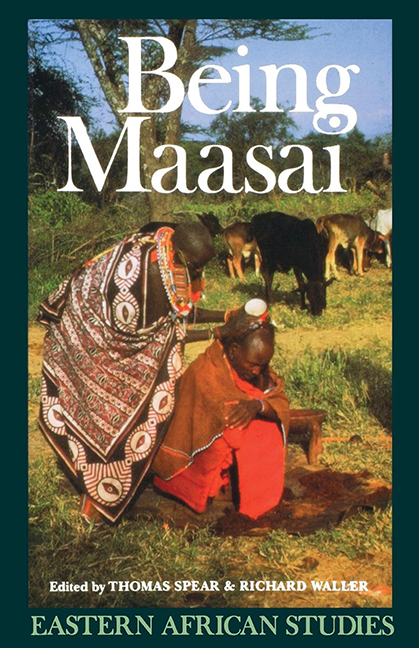Book contents
- Frontmatter
- Contents
- Maps, Figures & Illustrations
- Contributors
- Acknowledgements
- I Introduction
- II Becoming Maasai: Introduction
- 1 Dialects, Sectiolects, or Simply Lects? The Maa Language in Time Perspective
- 2 Becoming Maasailand
- 3 Maasai Expansion and the New East African Pastoralism
- 4 Aspects of ‘Becoming Turkana’: Interactions and Assimilation Between Maa- and Ateker-Speakers
- 5 Defeat and Dispersal: The Laikipiak and their Neighbours at the End of the Nineteenth Century
- 6 Being ‘Maasai’, but not ‘People of Cattle’: Arusha Agricultural Maasai in the Nineteenth Century
- III Being Maasai: Introduction
- IV Contestations and Redefinitions: Introduction
- V Conclusions
- Bibliography
- Index
4 - Aspects of ‘Becoming Turkana’: Interactions and Assimilation Between Maa- and Ateker-Speakers
from II - Becoming Maasai: Introduction
Published online by Cambridge University Press: 30 August 2017
- Frontmatter
- Contents
- Maps, Figures & Illustrations
- Contributors
- Acknowledgements
- I Introduction
- II Becoming Maasai: Introduction
- 1 Dialects, Sectiolects, or Simply Lects? The Maa Language in Time Perspective
- 2 Becoming Maasailand
- 3 Maasai Expansion and the New East African Pastoralism
- 4 Aspects of ‘Becoming Turkana’: Interactions and Assimilation Between Maa- and Ateker-Speakers
- 5 Defeat and Dispersal: The Laikipiak and their Neighbours at the End of the Nineteenth Century
- 6 Being ‘Maasai’, but not ‘People of Cattle’: Arusha Agricultural Maasai in the Nineteenth Century
- III Being Maasai: Introduction
- IV Contestations and Redefinitions: Introduction
- V Conclusions
- Bibliography
- Index
Summary
Although occasionally having to deviate from ideal social, cultural and economic practices, and even to abandon Maa speech, the Maasai peoples typically were the dominant party in interactions with their neighbours in the nineteenth century. Impressed by their ‘cattle complex’, military system, religious structures and a host of other cultural features, large numbers of outsiders were peacefully absorbed into Maasai society. In addition many other outsiders — occasionally entire communities of them — were swallowed up by Maasai advances as they came to control much of the central Rift Valley and the adjacent uplands.
A survey of contacts between Maa-speakers and the Turkana and Karimojong communities of the Ateker branch of the Eastern Nilotes, however, presents a study in contrast. Far from being overrun and absorbed by Maa-speakers, it was Ateker who predominated in these contacts, sometimes defeating Maa-speakers militarily and often absorbing them linguistically and politically. The means by which Ateker — especially the Turkana — were able to displace and/or assimilate their Maa-speaking neighbours throughout much of the nineteenth century emanated from a complex period of dynamic territorial expansion. Typical of such expansions elsewhere in Eastern Africa, that of the Turkana was intricate and multi-faceted, sometimes involving only a rather subtle territorial drift, but punctuated at frequent intervals by interactions, borrowings, adjustments, conflicts and assimilations. Again quite typical of similar expansions, the Turkana were to evolve an ever changing sense of selfhood and corporate identity from the experience. To paraphrase Turton's observation on the Mursi: the Turkana ‘did not make a journey; a journey made them’.
And yet, as will be shown in this chapter, two closely interrelated factors appear essentially to have underlaid this complex process. The first of these was favourable economic circumstances, entailing an early development of a ‘new pastor alism’, with wider patterns of transhumance supported by efficient commercial networks, and later by the emergence of a more diversified pastoral economy. As we shall see, these circumstances gave Turkana a distinct advantage over their neighbours, especially in times of severe ecological stress and major epizootics. The second factor, the successful waging of inter-ethnic conflict, was derived largely from the evolution of a more efficient military organization. Ironically, this evolution stemmed in part from ideas and institutions initially borrowed from Maa-speakers, but then creatively adapted to meet the demands of a changing political and cultural environment.
- Type
- Chapter
- Information
- Being MaasaiEthnicity and Identity in East Africa, pp. 87 - 104Publisher: Boydell & BrewerPrint publication year: 1993



